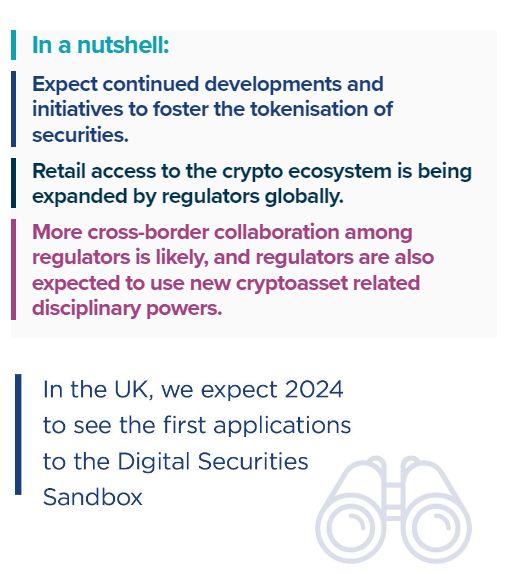- within Technology topic(s)
- in United States
- within Compliance topic(s)
- with Senior Company Executives, HR and Finance and Tax Executives
- with readers working within the Accounting & Consultancy, Consumer Industries and Media & Information industries
With crypto currencies and assets firmly lodged in the public mind, regulators need to lay guardrails to facilitate innovation and combat misbehaviour

Tokenisation of existing securities
Tokenisation of securities (securities that are traditionally issued but then represented digitally using distributed ledger technology (DLT), or security tokens that exist only on DLT) is a focus for many in the financial services industry including banks and financial market infrastructure.
The EU DLT Pilot regime launched in March 2023 and allows the testing of use of DLT for issuance, trading, and settlement of certain tokenised financial instruments.
In the UK, we expect 2024 to see the first applications to the Digital Securities Sandbox. The government hopes the sandbox will enable the issue, trading, and settlement of digital securities to be tested and help facilitate the adoption of digital asset technology in UK financial markets. Whether the UK sandbox will attract more applicants than the slow start experienced by the EU's DLT Pilot regime remains to be seen.
Work being carried on by a UK Government's asset management taskforce to establish the infrastructure for fund tokenisation is well under way. Its recommendation for a staged approach to implementing fund tokenisation, starting with a baseline model before adopting more complex approaches, is likely to lead to industry innovations in 2024.
Michelle Virgiany
Jakarta
In Singapore, through various industry pilots with different financial institutions as part of Project Guardian, MAS has found that tokenised financial assets such as fixed income, foreign exchange and asset management products can be traded, distributed, and settled seamlessly across borders. In order to grow this ecosystem effectively, MAS has stated that a key priority will be to design an open, digital infrastructure to host tokenised financial assets and applications. MAS will work with various industry partners on this initiative, which has been named Global Layer One.
In Hong Kong, since the new licensing regime for virtual asset trading platforms came into effect on 1 June 2023, the SFC and the HKMA have issued new and updated guidance on virtual assets and tokenised securities-related activities by licensed intermediaries, as well as on tokenisation of SFC-authorised investment products for public offering. These expressly permit retail access to the distribution and marketing of tokenised securities and set out the requirements for primary dealing of tokenised SFC-authorised investment products in Hong Kong. The SFC still adopts a prudent and progressive approach from an investor protection perspective and will keep secondary trading under review for the time being. In light of the additional guidance and increased regulatory certainty, we expect increased offerings of virtual asset-related investment products and tokenised securities and retail investment.
Hannah Cassidy
Hong Kong
Cryptocurrencies and other crypto assets
Unlike the EU's bespoke cryptoasset regulatory regime, the Markets in Crypto-Assets Regulation which was adopted in May 2023, the UK Government is planning to regulate cryptoasset by amending existing legislation and via a phased approach, with fiat-backed stablecoins used for payment and the regulation of activities in relation to other cryptoassets. The stablecoin regime in the UK is expected to be finalised in H2 2024, with implementation sometime in 2025.
Until a cryptoasset regulatory regime is in place, the UK FCA relies on its enforcement powers under the new cryptoasset promotions regime to protect retail investors from misleading marketing and scams. Just over two weeks after the start of the regime started in October 2023, the FCA had already issued 221 alerts about firms illegally promoting cryptoassets to customers.
In Singapore, cryptocurrencies and cryptoassets are generally regulated under the Payment Services Act 2019 if they fall within the definition of digital payment tokens. So far, the regulatory regime has focused on controlling anti-money laundering and technology risks. The focus is now moving on to investor protection, particularly retail investors. Currently, measures to protect retail investors include limiting retail access to cryptocurrencies and limiting the marketing of digital payment tokens to the retail public. MAS will be introducing further controls to limit consumer access by requiring digital payment token services providers to take steps such as determining a customer's risk awareness to access digital payment token services and limiting the value of cryptocurrencies in determining a customer's net worth.
Stablecoin is also another area where we expect to see a lot of development. MAS will introduce a stablecoin regulatory framework that will apply to single currency stablecoins pegged to the Singapore Dollar or any G10 currency that are issued in Singapore. Issuers must fulfil certain requirements under the framework for their stablecoins to be recognised as 'MAS-regulated stablecoins'. This aligns with MAS' aim to facilitate the use of stablecoins as a credible digital medium of exchange, and as a bridge between the fiat and digital asset ecosystems.
Patricia Horton
London
In Hong Kong, other initiatives are also being progressed, including plans to expand the regulatory remit to cover the buying and selling of virtual assets beyond trades taking place on virtual asset trading platforms; a joint consultation by the Financial Services and Treasury Bureau and the HKMA on the legislative proposal for implementing a regulatory regime for stablecoin issuers; and ongoing industry consultation on the HKMA's proposed guidance on banks' provision of digital asset custodial services, to ensure client assets are adequately safeguarded and that the risks involved are properly managed. The government will also seek to promote real economy related applications and innovations by the virtual asset sector, and further develop the regulatory framework for virtual asset-related activities.
In Indonesia, cryptocurrencies and cryptoassets generally have been regulated by Indonesia's Supervisory Agency for Commodity Futures Trading. But Law No. 4 of 2023 on Financial Services Development and Reinforcement, which was enacted in January 2023, provides that the supervision of digital financial assets, including crypto assets, be transferred to the Indonesia Financial Services Authority (Otoritas Jasa Keuangan or OJK) over a two-year period. OJK is currently preparing a masterplan and roadmap for digital financial assets and crypto assets in addition to new regulations on the same, which are expected to be more stringent, particularly on customer protection and enforcement.
Australia has had an existing licensing framework for cryptocurrency exchanges from an AML perspective for some time, but a new licensing framework for digital assets more broadly is under consultation. The government has stated that it would like the framework in place during 2024. Similar with other regimes it is proposing a model that focuses on regulating the operators of digital asset platforms and the custodians of digital assets, rather than the digital assets themselves.
Increased collaboration
As tokenisation projects grow in scale and sophistication, more cross-border collaboration among regulators is likely. Financial regulators in Switzerland, Japan and the UK have already joined forces with Singapore whose Project Guardian is testing the feasibility of applications in asset tokenisation and DeFi while managing risks to financial stability and integrity.
In Hong Kong, the SFC collaborated with the Hong Kong Police and took swift action against the alleged individuals involved in the JPEX case, considered as the city's single largest financial fraud case. With the amended legislation governing virtual assets taking effect, the SFC is expected to utilise its new virtual asset-related disciplinary powers against any misconduct in the sector.
The content of this article is intended to provide a general guide to the subject matter. Specialist advice should be sought about your specific circumstances.









